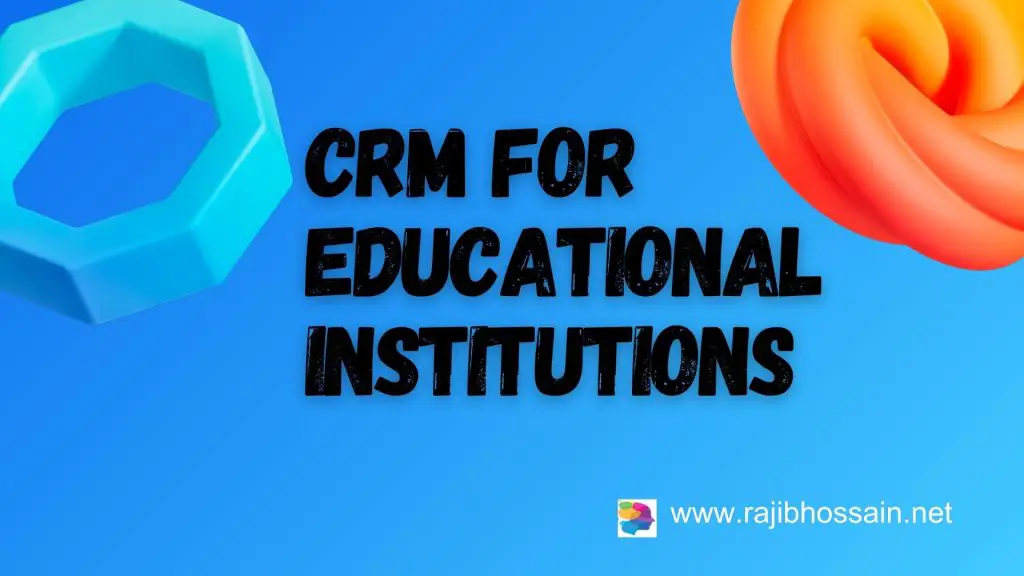
Educational institutions face unique challenges in managing student information, communications, and administrative tasks. A robust Customer Relationship Management (CRM) system can help streamline these processes, improve student engagement, and boost overall efficiency. This article explores the benefits of CRM for educational institutions, and key features to consider, and answers common questions about implementing CRM in the education sector.
Why Educational Institutions Need CRM Systems
Educational institutions, from schools to universities, need to manage large volumes of student data, streamline communications, and ensure efficient administrative operations. CRM systems offer numerous benefits:
- Improved Student Management: Centralized student records, including enrollment details, academic performance, and communication history.
- Enhanced Communication: Automated communication tools for sending important updates, reminders, and announcements to students and parents.
- Streamlined Admissions Process: Efficient management of the admissions process, from application tracking to enrollment.
- Data Analytics: Insights into student performance, engagement, and institutional efficiency.
- Alumni Relations: Maintaining relationships with alumni, managing events, and tracking donations.
- Resource Management: Efficient management of resources such as classrooms, equipment, and staff schedules.
Essential Features of CRM for Educational Institutions
When selecting a CRM for an educational institution, consider the following features:
- Student Management: Centralized database for student records, academic performance, and communication history.
- Admissions Management: Tools for managing applications, tracking admissions status, and communicating with prospective students.
- Communication Tools: Email and SMS capabilities for sending updates, reminders, and announcements.
- Analytics and Reporting: Detailed reports on student performance, enrollment trends, and institutional efficiency.
- Event Management: Tools for organizing and managing events such as orientations, graduations, and alumni reunions.
- Integration: Compatibility with other educational software such as learning management systems (LMS) and student information systems (SIS).
- Customization: Ability to tailor the CRM to meet the specific needs of the institution.
- Mobile Access: Access to CRM data on the go through mobile apps.
- Security: Robust security features to protect sensitive student information.
Top CRM Systems for Educational Institutions
Here are some of the best CRM systems tailored for educational institutions:
- Salesforce Education Cloud
- Features: Comprehensive student management, admissions tracking, communication tools, and analytics.
- Pros: Highly customizable, robust integration with other educational software.
- Cons: Higher cost, may require significant customization for small institutions.
- Pricing: Custom pricing based on institution size and requirements.
- HubSpot CRM
- Features: Student management, admissions tracking, communication tools, and reporting.
- Pros: User-friendly, free plan available, customizable.
- Cons: Limited education-specific features compared to specialized CRMs.
- Pricing: Free plan available; premium plans start at $50 per user per month.
- Zoho CRM
- Features: Student management, communication tools, admissions tracking, and reporting.
- Pros: Affordable, user-friendly, customizable.
- Cons: Limited integration options compared to broader CRM platforms.
- Pricing: Starts at $12 per user per month.
- Blackbaud CRM
- Features: Comprehensive student management, admissions tracking, alumni relations, and fundraising tools.
- Pros: Designed specifically for educational institutions, strong alumni and fundraising tools.
- Cons: Can be expensive for smaller institutions.
- Pricing: Custom pricing based on institution size and requirements.
FAQs
Q1: Is a CRM system necessary for small educational institutions?
- A: While not essential, a CRM system can significantly improve student management, communication, and operational efficiency, even for small institutions.
Q2: How do CRMs ensure student data security?
- A: CRMs for education are designed to comply with data protection regulations, featuring robust encryption, access controls, and regular security audits.
Q3: Can a CRM system integrate with existing educational software?
- A: Many CRMs offer integration capabilities with popular educational software such as LMS and SIS, ensuring seamless data transfer and workflow.
Q4: What are the initial steps to implement a CRM in an educational institution?
- A: Identify your institution’s specific needs, choose a CRM that meets those needs, train staff on its use, and gradually integrate it into your daily operations.
Conclusion
Implementing a CRM system in an educational institution can enhance student management, improve communication, and streamline administrative tasks, allowing educators to focus more on student engagement and success. By selecting a CRM with the right features and ensuring it meets regulatory requirements, educational institutions can boost their operational efficiency and student satisfaction.
